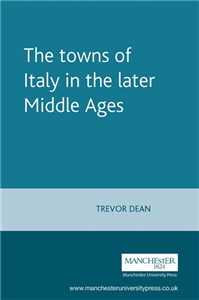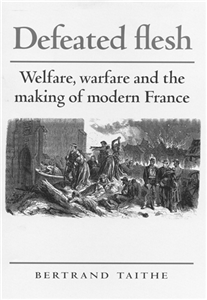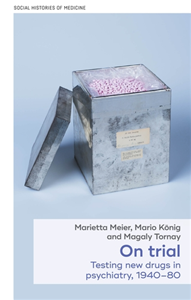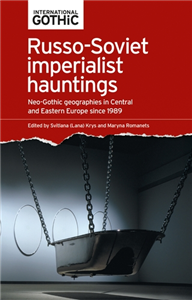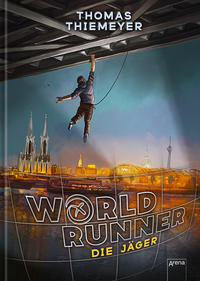Your Search Results
-
Promoted Content
-
Promoted Content
-
 Trusted Partner
Literature & Literary StudiesMay 2000
Trusted Partner
Literature & Literary StudiesMay 2000The towns of Italy in the later Middle Ages
by Rosemary Horrox, Trevor Dean, Simon Maclean
The towns of Italy in the later middle ages presents over one hundred fascinating documents, carefully selected and coordinated from the richest, most innovative and most documented society of the European Middle Ages. No other English language sourcebook has the same geographical or chronological range. This collection is carefully structured around the crisis of the fourteenth century and arranged in contrasting groups of texts. By connecting documents in translation to recent scholarship and debates, it addresses five key areas of medieval urban history: the physical environment, civic religion, economy, society and politics. Offers students well-translated and effectively contextualised documents along with some guidance to the secondary work of Italian scholars which is largely inaccessible to undergraduate students. ;
-
 Trusted Partner
Literature & Literary StudiesJanuary 2013
Trusted Partner
Literature & Literary StudiesJanuary 2013The towns of Italy in the later Middle Ages
by Trevor Dean
The towns of Italy in the later middle ages presents over one hundred fascinating documents, carefully selected and coordinated from the richest, most innovative and most documented society of the European Middle Ages. No other English language sourcebook has the same geographical or chronological range. This collection is carefully structured around the crisis of the fourteenth century and arranged in contrasting groups of texts. By connecting documents in translation to recent scholarship and debates, it addresses five key areas of medieval urban history: the physical environment, civic religion, economy, society and politics. Offers students well-translated and effectively contextualised documents along with some guidance to the secondary work of Italian scholars which is largely inaccessible to undergraduate students.
-
 Trusted Partner
Humanities & Social SciencesApril 2010
Trusted Partner
Humanities & Social SciencesApril 2010Defeated flesh
Welfare, warfare and the making of modern France
by Bertrand Taithe
Defeated flesh dwells on the French defeat of 1870 and the socialist uprising of the Commune of Paris.. This is one of the first books to develop an in-depth, comparative analysis of the Franco-Prussian war and the Commune.. By looking at the history of the body and medicine it considers how the French people mobilised for the war effort and how their ultimate defeat had cultural and social consequences which led to the fin-de-siècle spirit.. Looking at the siege of Paris, the war suffering and rationing in an exceptionally harsh period of French history it revises the current debates on citizenship, centralisation and modern warfare.. Looking at many untouched sources, Taithe seeks to understand why 1870-1871 became such an important phase in the making of modern France. ;
-
 Trusted Partner
MedicineJanuary 2026
Trusted Partner
MedicineJanuary 2026On trial
Testing new drugs in psychiatry, 1940–1980
by Marietta Meier, Mario König, Magaly Tornay
The heroic story of the invention of antidepressants is a key part of the psychopharmaceutical turn. On Trial revolves around one of its pioneers, psychiatrist Roland Kuhn, who practiced in Münsterlingen, a state-run psychiatric hospital in Switzerland. Kuhn became famous for the 'discovery' of the first antidepressant, Tofranil, and more recently notorious for his numerous trials on often unsuspecting patients. Largely based on the extensive and previously inaccessible sources of Kuhn's private archive, the book delves into the early days of industry-sponsored clinical research in psychiatry. It examines how the clinic, patients, doctors, nursing staff, corporations, and authorities interacted in the trials. Conducted from the 1940s to 1980s, the Münsterlingen drug trials are historicised and situated in the period's evolving landscape of experimentation.
-
 Trusted Partner
MedicineJuly 2024
Trusted Partner
MedicineJuly 2024On trial
Testing new drugs in psychiatry, 1940–1980
by Marietta Meier, Magaly Tornay, Mario König
The heroic story of the invention of antidepressants is a key part of the psychopharmaceutical turn. On Trial revolves around one of its pioneers, psychiatrist Roland Kuhn, who practiced in Münsterlingen, a state-run psychiatric hospital in Switzerland. Kuhn became famous for the 'discovery' of the first antidepressant, Tofranil, and more recently notorious for his numerous trials on often unsuspecting patients. Largely based on the extensive and previously inaccessible sources of Kuhn's private archive, the book delves into the early days of industry-sponsored clinical research in psychiatry. It examines how the clinic, patients, doctors, nursing staff, corporations, and authorities interacted in the trials. Conducted from the 1940s to 1980s, the Münsterlingen drug trials are historicised and situated in the period's evolving landscape of experimentation.
-
 Trusted Partner
Literature & Literary StudiesMay 2026
Trusted Partner
Literature & Literary StudiesMay 2026Russo-Soviet imperialist hauntings
Neo-Gothic geographies in Central and Eastern Europe since 1989
by Svitlana Krys, Maryna Romanets
Russo-Soviet imperialist hauntings attempts to capture some of the ghosts of the colonial and totalitarian past that have been proliferating in international political and cultural landscapes after the collapse of the USSR. By conflating postcolonial, post-totalitarian, postcommunist, and Gothic discourses, it maps virtually untouched aspects of cultural decolonization, focusing on unsettling "hauntings" of unresolved memory traces of Russo-Soviet domination in the former Eastern Bloc countries and Soviet republics. Operating within a vast intertextual field of social, cultural, and ideological discourses, the volume enables a productive exchange across distinct (inter)disciplinary boundaries and represents a range of voices from Europe and North America. The contributors' diverse interests draw on transmedia (literature, visual arts, and film), transnational, and translingual (diasporic literature) approaches, providing insights into a variety of forms that the Gothic has taken in the (late) twentieth and twenty-first centuries, and demonstrating its consistent engagement with history, ideology, and politics.
-
 Trusted Partner
Literature & Literary StudiesMarch 2017
Trusted Partner
Literature & Literary StudiesMarch 2017Asia in Western fiction
by Robin Winks
Any reader who has ever visited Asia knows that the great bulk of Western-language fiction about Asian cultures turns on stereotypes. This book, a collection of essays, explores the problem of entering Asian societies through Western fiction, since this is the major port of entry for most school children, university students and most adults. In the thirteenth century, serious attempts were made to understand Asian literature for its own sake. Hau Kioou Choaan, a typical Chinese novel, was quite different from the wild and magical pseudo-Oriental tales. European perceptions of the Muslim world are centuries old, originating in medieval Christendom's encounter with Islam in the age of the Crusades. There is explicit and sustained criticism of medieval mores and values in Scott's novels set in the Middle Ages, and this is to be true of much English-language historical fiction of the nineteenth and early twentieth centuries. Even mediocre novels take on momentary importance because of the pervasive power of India. The awesome, remote and inaccessible Himalayas inevitably became for Western writers an idealised setting for novels of magic, romance and high adventure, and for travellers' tales that read like fiction. Chinese fictions flourish in many guises. Most contemporary Hong Kong fiction reinforced corrupt mandarins, barbaric punishments and heathens. Of the novels about Japan published after 1945, two may serve to frame a discussion of Japanese behaviour as it could be observed (or imagined) by prisoners of war: Black Fountains and Three Bamboos.
-
 Trusted Partner
January 1992
Trusted Partner
January 1992Der Engel schwieg
by Böll, Heinrich
The Silent Angel, written between 1949-1950, is Böll’s first novel set in post-war Germany. It begins on May 8, 1945, the day of Germany’s capitulation, and leads us into the debris of a German city. Maybe this was the reason why the manuscript was not published back then after all. People did not want to be reminded of the misery that they had just overcome. So the manuscript was left in a drawer and became a Böll’s quarry and humus for his later works. Today the novel reads like the energetic centre of remembrance which coined Böll’s work. Böll shows the existence of man after the end of everything. A soldier, deserted and with falsified documents, returns to his bombed out home city – looking for bread, a home and for people. He finds humanity, but also the cruelness of self-interest, coated in Christian hypocrisy. Untouched by this the love story remains “clear and brittle, appropriate for the returning generation which knows that there is no such thing as home on this earth.” (Böll) This early novel remained unpublished for more than fourty years, because its subject matter, the immediate aftermath of the war, conjured up too much of what people wished to forget. The novel was only published for the first time in 1992 and became a great success. All major motives of Böll’s work were already present here – a discovery and at the same time an ideal introduction to Böll’s work.
-
 Trusted Partner
March 2021
Trusted Partner
March 2021Columbus, the Discarded Explorer
Disaster of the legendary sailor
by Wolfgang Wissler
There he stands, the man the whole of Spain cheered, before whom the most catholic regents Isabella and Ferdinand rose to their feet, his eyes on his ship Capitana, devoured by shipworm, stranded off Jamaica. Some of the crew mutiny, the locals can no longer be fobbed off with glass beads, the Spanish on the nearby island of Hispaniola do not help, the world doesn‘t want anything to do with him, the demanding whinger. He, Christopher Columbus, is a John Lackland, a king without land, a conqueror without conquest. Between fiction and historical truth, Wolfgang Wissler recounts the legendary sailor‘s last expedition in an entirely new way – and what a story it is!
-
 Trusted Partner
Children's & YA
Trusted Partner
Children's & YAWorld Runner (2). The Hunted
by Thomas Thiemeyer
Tim, who with Annika and Malte has qualified for the second round, is confronted with the biggest challenge of his running career: he, his friends and their arch rivals Jeremy, Darius and Vanessa must form a team that will perform perfectly together. How well they succeed will be judged by millions of spectators, because every moment of this competition will be broadcast live by the media company Global Games. The decision as to who wins has long since ceased to be a matter of ability. Whether the prize is worth the challenge is open to question.
-
 Trusted Partner
Children's & YA
Trusted Partner
Children's & YAWorld Runner (1). The Hunters
by Thomas Thiemeyer
Tim is one of them. A runner full of passion, ready to go beyond the limits. When one day he gets a letter from GlobalGames he doesn’t hesitate to accept the challenge for a second. 7 caches have been hidden in 7 locations. 100 young people are chasing after them. Each one against the others. But Tim soon realises that he can’t do it alone. He finds an ally in the fascinating Annika, known as Sakura. But can he really trust her? Or is everyone just running for themselves after all? Who’s ready to go the furthest to find the biggest cache in the world?
-
 Trusted Partner
2025
Trusted Partner
2025Among Neighbours
The strangest relationship of our lives
by Bernd Imgrund
There are many things in life that we are (more or less) free to choose: our circle of friends, our workplace, our place of residence. However, we have to take some communities as they come: We cannot choose our family or our neighbours, for example. Why this does not only lead to the much-vaunted idyllic sense of belonging and what tensions forced social relationships can cause: This is the subject of this fascinating collection of essays by Bernd Imgrund. It sheds light on a piece of social history that we all know from our own experience: who hasn't had an argument with their immediate neighbour or made fun of the residents of the neighbouring district? But it is by no means only negative aspects that characterise neighbourly relations. Pride in one's neighbourhood, help within a village community: the many advantages of a social community, its importance and its representation in art and literature have also found their way into this book.




